

Why Goals Don't Work as We Expect — Bohdan Kit. We relentlessly set goals — weekly, monthly, yearly.
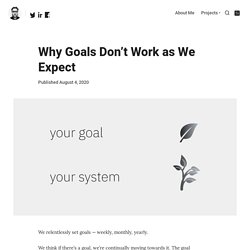
We think if there’s a goal, we’re continually moving towards it. The goal resembles a destination, and it seems as if our desire is strong enough, we’ll be able to get there. But it’s not the case. As James Clear pointed out, winners and losers have the same goals. Every Olympian wants to win gold at the next games. But not everyone succeeds. Time alone (chosen or not) can be a chance to hit the reset button. Solitude has become a topic of fascination in modern Western societies because we believe it is a lost art – often craved, yet so seldom found.
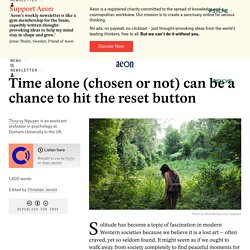
It might seem as if we ought to walk away from society completely to find peaceful moments for ourselves. Yet there is a quote I really like from the book Solitude: In Pursuit of a Singular Life in a Crowded World (2017) by the Canadian journalist Michael Harris: I don’t want to run away from the world – I want to rediscover myself within it. I want to know what happens if we again take doses of solitude from inside our crowded days, along our crowded streets.
Steadily, slowly, research interest in solitude has been increasing. Updates on everything new at Aeon. Oliver Burkeman's last column: the eight secrets to a (fairly) fulfilled life. In the very first instalment of my column for the Guardian’s Weekend magazine, a dizzying number of years ago now, I wrote that it would continue until I had discovered the secret of human happiness, whereupon it would cease.
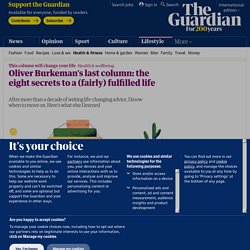
Typically for me, back then, this was a case of facetiousness disguising earnestness. Obviously, I never expected to find the secret, but on some level I must have known there were questions I needed to confront – about anxiety, commitment-phobia in relationships, control-freakery and building a meaningful life. Writing a column provided the perfect cover for such otherwise embarrassing fare. Grief. That Discomfort You’re Feeling Is Grief. Executive Summary During the global pandemic, a palpable sense of collective grief has emerged.
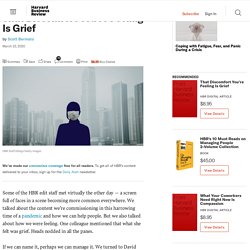
Grief expert David Kessler says that grief is actually multiple feelings that we must manage.
The voice of sadness is censored as sick. What if it’s sane? I remember being depressed.
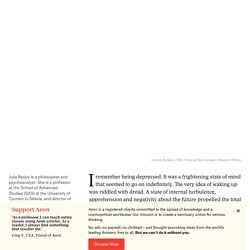
It was a frightening state of mind that seemed to go on indefinitely. The very idea of waking up was riddled with dread. A state of internal turbulence, apprehension and negativity about the future propelled the total collapse of a positive and optimistic attitude. I felt like my mind suddenly became sick and twisted. Laziness Does Not Exist - Human Parts. Let’s look at a sign of academic “laziness” that I believe is anything but: procrastination.
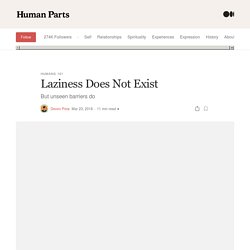
People love to blame procrastinators for their behavior. Putting off work sure looks lazy, to an untrained eye. Even the people who are actively doing the procrastinating can mistake their behavior for laziness. It’s better to focus on where you are going than how you are feeling. The notion that emotional pain and suffering reflect a deviation from a default happy baseline has been referred to as the ‘assumption of healthy normality’.
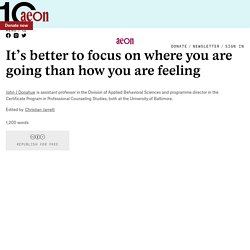
But it’s a mistaken assumption. Estimates of the lifetime prevalence of psychiatric disorders indicate that around one in two adults will meet the criteria for a mental-health condition at some point in their lives. Given that psychological pain is so ubiquitous, we should focus less on what might make us happy, and more on achieving a sense of meaning, regardless of how we’re feeling. Psychotherapy should help people manage effective functioning while they are distressed, above and beyond aiming to reduce symptoms such as difficult thoughts, emotions and sensations.
Acceptance and commitment therapy (ACT) takes this approach, using mindfulness, acceptance and other behavioural strategies to promote more flexible and value-driven behaviours. « Demande-toi ce que tu peux faire pour t’en sortir. » Les livres de développement personnel se vendent comme des petits pains, particulièrement en ces temps de bonnes résolutions.
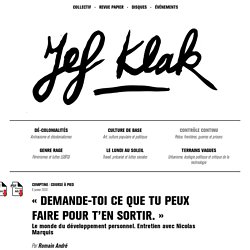
The Modern Trap of Feeling Obligated to Turn Hobbies Into Hustles. Who is living your dream? Dinner was in just a few minutes and I was mentally preparing myself to feel… miserable.
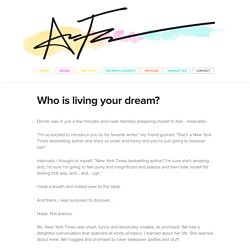
Study Says Making Art Reduces Stress, Even If You Kind Of Suck At It. The Psychology of Getting Unstuck: How to Overcome the “OK Plateau” of Performance & Personal Growth. “Any sequence of mental action which has been frequently repeated tends to perpetuate itself,” William James wrote in his influential meditation on habit, ”so that we find ourselves automatically prompted to think, feel, or do what we have been before accustomed to think, feel, or do, under like circumstances.”
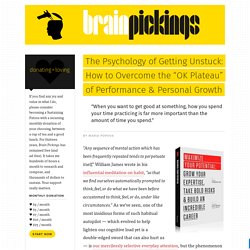
As we’ve seen, one of the most insidious forms of such habitual autopilot — which evolved to help lighten our cognitive load yet is a double-edged sword that can also hurt us — is our mercilessly selective everyday attention, but the phenomenon is particularly perilous when it comes to learning new skills. In a chapter of Maximize Your Potential (public library) — that fantastic guide to making your own luck, the sequel to 99U’s blueprint to mastering the pace of productivity and honing your creative routine — science writer Joshua Foer explores the mechanisms that keep us from improving and the strategies we can use to disarm them.
La zone de confort du prof de yoga – Alix Alleguede Yoga. « Le yoga c’est pour tout le monde. Le yoga c’est pour tous les corps. Le yoga s’adapte à tout le monde ». On a beau le crier sous tous les toits (et c’est hyper important de le crier partout en vrai), en tant que prof, au final on a souvent les mêmes profils d’élèves en cours. Plus ou moins les mêmes corps. Plus ou moins les mêmes profils socio-culturels. Et cela devient une habitude. Dans le cadre d’un partenariat, j’ai donné un cours aux membres d’une association. On m’avait demandé un petit cours de 40mn, débutant. Sans savoir que ces 40mn allaient m’emmener bien loin de ma zone de confort et me faire réfléchir sur mon enseignement. Je suis arrivée, Starbucks à la main, avec mes nouveaux cheveux violets et suis tombée nez à nez avec 6 femmes qui m’ont dévisagées de la tête au pied en un seul regard.
C’est facile d’ignorer, de détourner le regard quand on a peur, quand on ne sait pas comment agir. On Sofa Jumping -The Book of Life. Adult social life labours under an arduous rule: that the better we want to get to know someone, the more serious should be the topics we try to raise with them. It might be acceptable to discuss the weather with a passing acquaintance, but when it comes to a wish to open ourselves up to someone else and to discover their profound selves in turn, then we should head for the graver themes of existence: what we truly want to get out of our careers, what motivates us in relationships, how we assess our families, what politics should aim for.
Seriousness of mind is, in this view, the royal road to friendship. And yet, if self-disclosure and familiarity are really the underlying goals, then we may more closely have to the study the behaviour and wisdom of small children and in particular their insight that one cannot claim to know anyone well until the body has been closely engaged in the process of acquaintanceship. Alain de Botton on Existential Maturity and What Emotional Intelligence Really Means. “Maturity is the ability to live fully and equally in multiple contexts,” poet and philosopher David Whyte wrote in one of his most beautiful meditations.
Ongoingness: Sarah Manguso on Time, Memory, Beginnings and Endings, and the True Measure of Aliveness. Some of humanity’s most celebrated writers and artists have reaped, and extolled, the creative benefits of keeping a diary. For John Steinbeck, journaling was a tool of discipline and a hedge against self-doubt; for Virginia Woolf, a way to “loosen the ligaments” of creativity; for André Gide, a conduit to “spiritual evolution”; for Anaïs Nin, who remains history’s most dedicated diarist, the best way to “capture the living moments.” Joining the canon of insightful meta-diarists is Sarah Manguso with Ongoingness: The End of a Diary (public library) — a collection of fragmentary, piercing meditations on time, memory, the nature of the self, and the sometimes glorious, sometimes harrowing endeavor of filling each moment with maximum aliveness while simultaneously celebrating its presence and grieving its passage.
I wrote so I could say I was truly paying attention. Experience in itself wasn’t enough. What if All I Want is A Mediocre Life?